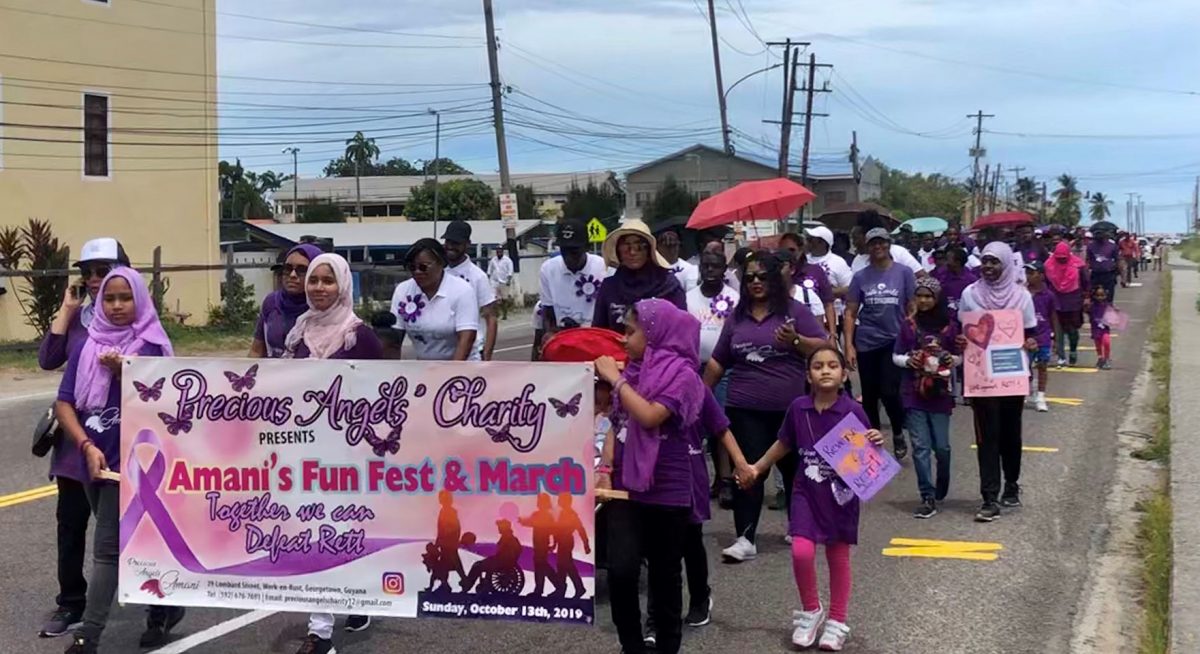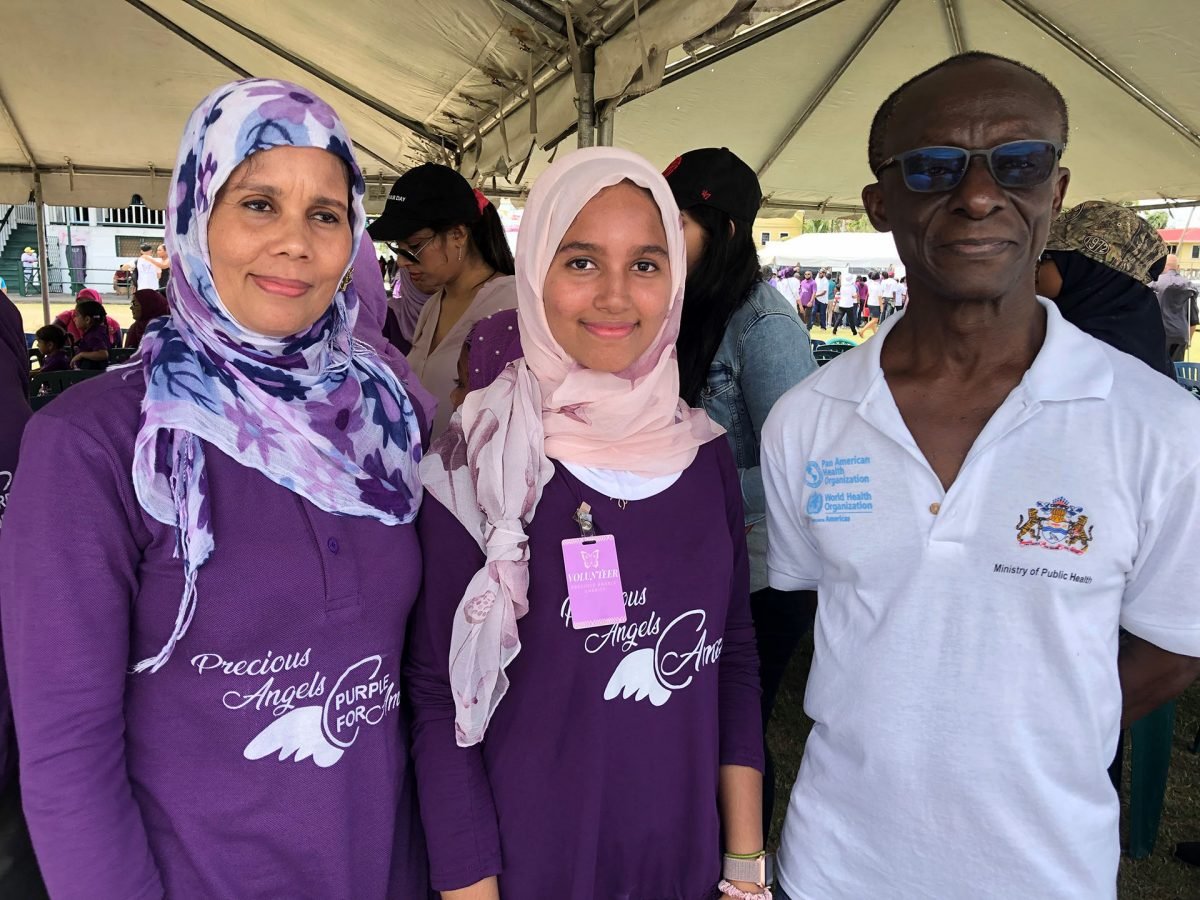Following a walk on Sunday that 17-year-old Hadiyyah Mohamed and the Precious Angels Charity (PAC) organised to raise awareness of Rett Syndrome, the Pan-American Health Organisation/World Health Organisation (PAHO/ WHO) promised to partner with her.
In his presentation, Dr. William Adu-Krow said that they would “work with Hadiyyah and team to make sure that Rett becomes one of the syndromes that we would start working with seriously to bring it to the fore.”
Rett Syndrome is a rare genetic neurological and developmental disorder that affects the way the brain develops. It causes a progressive loss of motor skills and speech.

Mohamed told the packed audience that with October being Rett Syndrome Awareness Month globally, she and her team decided to raise awareness in Guyana through a walk that was “the highlight” of the day’s event.
She also launched the Precious Angels Charity, a foundation that has been “created to inform the public about the debilitating disorder that silences little girls” and steals their independence and their abilities.
Her inspiration to become proactive came from her six-year-old niece, Amani Mohamed who was diagnosed with the disease.
Like other children with the disorder, Amani was “quite normal” in the beginning and was “very chubby.” She also made eye contact and started saying a few words.
But at age two, all this changed. She lost weight rapidly, lost her hand movements and would wring the front of her clothes. She had stopped walking as well and stopped making eye contact. She had to be taken to the dentist because she had damaged her teeth through severe grinding.
She was unable to eat because of the loss of muscle tone and had also developed problems with her bowels.
Mohamed, a sixth form student of the School of the Nations, had told Stabroek News that her niece was having a lot of silent seizures and it was “very scary.” Thankfully they have “eased up now…”
At first she was diagnosed with autism but after the doctor realized that there was something more, he sent them to Trinidad for testing. After the diagnosis, Mohamed recalled, “It was a very devastating day for us.”
It was a relief that she was finally diagnosed though because according to Mohamed: “We didn’t know when she was hurting what was hurting her and what was happening to her.”
Bear fruit
Dr. Adu-Krow was happy that her effort has started to bear fruit and he was “appreciative of the fact that a young mind such as hers can do it…”
He also pledged that: “PAHO/WHO office would stand with her and all others who are interested in Rett Syndrome to make sure that it does not bring untold hardship to our population.”
And in recognition of her great work, he plans to invite her to the PAHO National Media Awards in December and said that they “would definitely honour her.”
He thanked her for her initiative and pointed out that the “the fight is not only hers, the fight is not only for this foundation but it is for all of us.”
Dr. Adu-Krow said that for every 10,000 to 22,000 baby girls born, one would have Rett Syndrome and it can be passed on in the family. Rett is a neurological issue that affects the nerves, brains, motor systems and communication.
He explained too that some of the symptoms include changes in development, loss in weight, muscles becoming rigid, causing abnormal hand movements. He also said that the child can have seizures, which can result in death or scoliosis.
He reiterated that he is happy that Mohamed is bringing it to the forefront since many of the health workers he spoke to had learnt about it during their studies but forgot what it is all about.
He said too that while the disorder cannot be cured, the symptoms can be treated or controlled. The awareness exercise, he said, can “increase the index of suspicion.” For instance, if a mother takes a girl child of about 18 months to the clinic with seizures, “it sets you thinking” and leads to tests being conducted.
He said that the disorder cannot be diagnosed just by asking questions but by chromosomes analysis, which is done through a blood test.
If Rett is managed well and there are proper doctors, nurses and support systems to deal with the symptoms, you can live a good life, Dr. Adu-Krow said.
He made reference to sickle cell, noting that it was believed that people with the condition cannot live beyond their 20s but they are now living to older ages.
Discriminated
Mohamed said differently-abled people are often being discriminated against and looked down upon, sexually abused, assaulted, abandoned and sometimes even disowned for just being the way they are.
She also said that they are deprived of basic needs for survival, as well as love, care, support and attention. “Everyday people with disabilities are challenged, not because of their condition but because of people; the human race who discriminate and oppress them,” she said.
“People with disabilities have hearts and souls and are actual human beings and can achieve great success if they are given enough opportunities.”
According to her, “It doesn’t matter what they look like on the outside but what is on the inside that counts. Society today lacks that understanding…”
She said it took her family a while to adjust to Amani’s condition and that it was not entirely easy. They were back and forth from different hospitals, neurologists and doctors and they all the same lucid answer to their ongoing questions.
While there is no cure for Rett Syndrome, Mohamed said there is hope and love. She recalled feeling hopeless and despondent but took courage from Amani’s magical smiles.
With regards to her accepting her niece’s condition, she said: “It took an ocean of tears and many sleepless nights for us to understand that nothing can be done to change the way she is” but that they can provide love, care and safety and raise awareness about the disorder.
She commended Amani’s mother Nadia Mohamed for her strength and dedication in taking care of the child.
She thanked God for Amani’s progress and what her condition led to, saying: “God has a reason for allowing things to happen. We may never understand his wisdom, but we simply have to trust His will.”
She expressed gratitude to Dr. Adu-Krow for being a part of the event and for his presentation, as well as to her sponsors and to the countless people who provided donations and those who supported her in any way.










